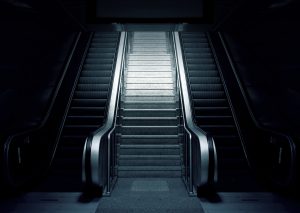 In our previous post, we reviewed the causes of elevator and escalator accidents and the common injuries that victims suffer. In this post, we’ll be discussing the long-term consequences of these accidents and some of the legal issues you may encounter.
In our previous post, we reviewed the causes of elevator and escalator accidents and the common injuries that victims suffer. In this post, we’ll be discussing the long-term consequences of these accidents and some of the legal issues you may encounter.
Elevator and Escalator Accidents Can Disrupt Your Day-to-Day Life
In addition to the serious physical injuries listed in our previous post, elevator and escalator accidents can significantly disrupt your day-to-day life for weeks and even months. In some cases, you may be facing a long-term or even permanent disability. As a result, there are several potential long-term consequences you need to consider:
- Loss of income due to missing work for doctor’s appointments and treatment
- Loss of employment due to disability
- Loss of mobility
- Additional transportation costs: you can no longer drive or have increased transportation needs for medical treatment
- Additional expenses due to necessary accommodations and medical equipment: for example, you need handrails installed in your home or a wheelchair
- Loss of sleep
- Emotional and mental trauma such as depression and anxiety
- General pain and suffering
Escalator accidents can be traumatic events with consequences that go beyond the medical bills. What may seem like a relatively minor injury could negatively change your life for months and years to come.
Who Is Responsible for Your Injuries and Other Losses?
If you’ve been injured, you’re probably worried about getting treatment for your injuries and how you’re going to pay your bills. Unfortunately, sorting out who is at fault for your accident can be quite difficult. Escalators and elevators are typically found in buildings owned by corporate entities. These corporations may not be willing to admit fault and are likely to claim that some other corporation should be held responsible. You should also bear in mind that they will be represented by lawyers who will use their knowledge of the law and the legal system to the corporation’s advantage.
To further complicate matters, there may be more than one party that should be held liable, but each one is responsible for different reasons. The following are some of the entities that may be held liable for your accident:
The property owner. Property owners have a duty to ensure that their property is safe for their guests and anyone else who is allowed to be on the property. When a guest is injured as a result of the property owner’s negligence, the property owner may be held liable. A property owner is negligent when they fail to correct an unsafe condition they knew or should have known about. If the property owner knew or should have known that the elevator was dangerous, they should have prevented guests from using it until it could be repaired.
The elevator servicing company. Property owners typically hire another company to regularly inspect and maintain their elevators. If the serving company did not conduct regular inspections or fail to make necessary repairs, they may be held liable.
The elevator manufacturer. If your injury was due to the design of the elevator or escalator, you may have to sue the designer or manufacturer.
The construction company who installed the elevator or escalator. If your injury was due to poor construction, you may have to sue the company who constructed and installed the elevator or escalator.
It’s important to keep in mind that each of those parties is likely to blame the other for causing your accident. As a result, there may be multiple parties that need to be held responsible.
Slappey & Sadd – Atlanta Elevator and Escalator Accident Attorneys
Since 1992, the attorneys at Slappey & Sadd have been helping injured Georgians get the compensation they need to move on with their lives. We offer our clients responsive and effective legal representation. If you’ve been injured in an elevator or escalator accident, schedule a free consultation with one of our lawyers by calling 888-474-9616 or contacting us online.
 Georgia Injury Lawyers Blog
Georgia Injury Lawyers Blog

